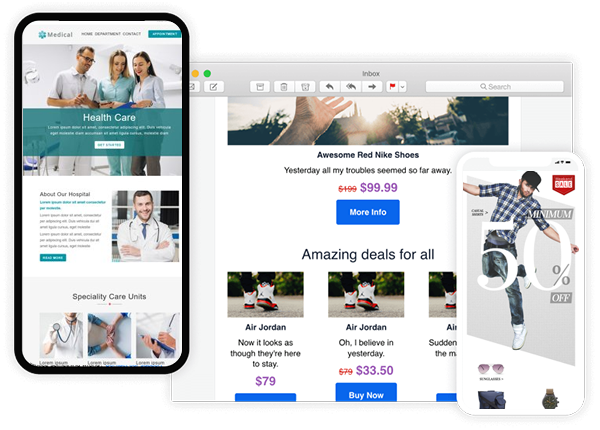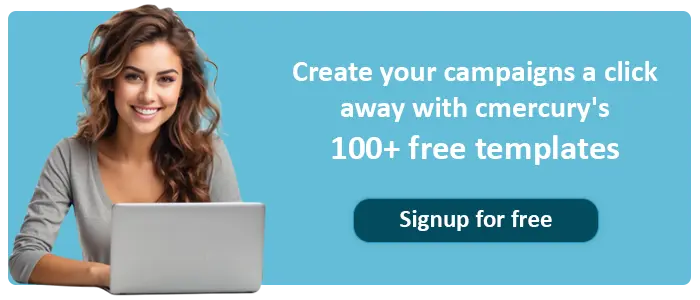Email Newsletter Design is one of the most critical aspects of email marketing. A well-structured newsletter not only informs but also engages and converts. At cmercury, I’ve designed thousands of HTML email templates for diverse industries, and I’ve seen firsthand how good design can dramatically improve open rates, click-throughs, and ROI.
Whether you’re focused on B2B email marketing or B2C campaigns, following responsive email newsletter best practices ensures your message captures attention and drives action. In this guide, we’ll cover proven techniques for email newsletter design, from layout essentials to personalization strategies that enhance engagement.
What is Email Newsletter Design?
Email newsletter design refers to the planned layout of text, visuals, and interactive features that shape the reader’s experience. Great email design isn’t only visual, it’s about building a user experience that drives higher open rates, clicks, and conversions.
A great design focuses on:
- Readability: Clear fonts, logical layout, and scannable sections.
- Responsiveness: Mobile-friendly design across all devices.
- Accessibility: Optimized for users with visual impairments.
- Personalization: Tailored, dynamic email content strategies that resonate.
In short, strong design delivers results, not just content.
10 Email Newsletter Design Best Practices
1. Use a Clear Visual Hierarchy
Guide readers through your message using headings, subheadings, and consistent formatting. A logical flow improves readability and ensures key messages don’t get lost.
2. Apply Modular Email Template Design
Reusable design blocks make newsletters scalable and consistent. Following email template modules design best practices ensures faster production and easy adjustments for campaigns.
3. Ensure Responsive Layouts
With over 60% of emails opened on mobile devices, responsive email newsletter best practices are non-negotiable. Use flexible grids and scalable images to ensure readability on every screen.
4. Personalize with Dynamic Content
Personalization is more than adding a name. Segment audiences and add personalized dynamic email content strategies such as product recommendations or tailored visuals to boost relevance and engagement.
5. Collaborate with Your Creative Team
Successful design is a team effort. Successful email campaigns happen when copywriters, designers, and marketers work together, sharing analytics and testing ideas. This synergy produces visuals that resonate and copy that converts.
6. Prioritize Accessibility
Design for all readers, including those with visual impairments. Ensure accessibility in email design by using strong contrast, image alt tags, and clear typography..
7. Keep Emails Skimmable
Users spend only a few seconds scanning. Short paragraphs, bullet points, and bold headings improve scanability. This aligns with email design for accessibility and engagement, ensuring your emails are inclusive and effective.
8. Optimize CTAs for Conversions
Every newsletter should have a strong call-to-action (CTA). Use contrasting colors, action-driven text, and ample whitespace around the button. A/B test button designs to learn what resonates with your audience.
9. Maintain Brand Consistency
Use your logo, brand colors, and typography consistently. Consistent use of brand elements in email design improves recognition and builds long-term audience loyalty. This is particularly vital for long-term B2B relationships.
10. Test, Learn, Iterate
No two audiences are the same. Continuously test subject lines, visuals, layouts, and CTA placements. Use tools like heat maps, click-to-open rate tracking, and scroll depth analysis to refine future campaigns.
General Tips for Autoresponders and Campaign Emails
Autoresponders such as onboarding emails, abandoned cart reminders, or nurture sequences should also follow these principles:
- Start with Purpose: Define the goal of each campaign.
- Visual Flow Matters: Use Z-pattern or F-pattern layouts to guide attention.
- Balance Text and Images: Ensure images enhance, not overwhelm, your message.
- Engage Emotionally: Add storytelling elements that connect with the reader.

Creative Email Marketing Doesn’t Mean Cutting Corners
If you’re exploring creative free email marketing tools, remember: free doesn’t mean low-quality. There are open-source email template libraries and ESPs that support professional-level design. The key is applying best practices, not skipping them.
Key Metrics to Track for Email Newsletter Design
Design should be data-driven. Measure performance with:
- Click-to-Open Rate (CTOR): Do visuals and CTAs engage effectively?
- Scroll Depth: Are readers engaging with all content?
- Heat Maps: Which areas attract attention and clicks?
B2B Email Marketing Design Best Practices
When targeting professionals, B2B email newsletter design should be clear, concise, and minimalistic. Avoid clutter and highlight only what matters. Infographics, charts, or icons can simplify complex concepts and improve scanability.
Final Thoughts
Crafting high-performing email newsletters requires both artistic design and smart planning. By applying these email newsletter design best practices, you can boost engagement, strengthen your brand identity, and achieve measurable results.
At cmercury, we believe email design is not just about looking good—it’s about working smart. By blending aesthetics with analytics, your email newsletters can deliver both beauty and performance.

Disclaimer: This blog post was created with the assistance of Human Content Creators, AI and Search tools to help collect information, plan content, and ensure accuracy. We strive to deliver valuable and well-researched insights to our readers.
